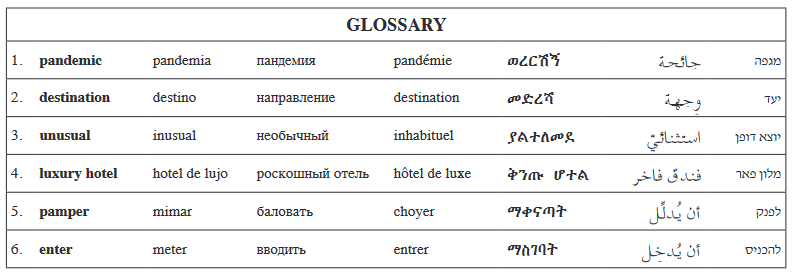יש לענות על כל השאלות בדף העבודה. עבודה נעימה.
WORKING HARD ON VACATION
I Just before the Covid pandemic, Jill Corden went on vacation to Hawaii – a popular tourist
destination that is famous for its wonderful climate, beautiful beaches and amazing landscapes.
Jill was one of over 10 million tourists who visited Hawaii in 2019. But, unlike almost all tourists
everywhere, she didn't go to admire the scenery or lie in the sun. Instead, she was there on a new
type of vacation arranged by the EcoTrips company, and spent much of her time planting trees in
the countryside.
II In one way, Jill's vacation is not unusual. For over 50 years, small groups of young
people have been traveling all over the world for their vacations, participating in environmental
programs. Some, for example, go to care for injured wild animals. Others help clean polluted
rivers, or work on local farms. These groups live in tents and cook their own meals. Jill, too,
worked hard during the day. But afterwards, a luxury hotel was waiting for her with everything
that a five-star hotel offers, including a large swimming pool.
III In the past year, vacations like the one Jill went on have become very popular. "It's partly
because people want to get out into nature after staying at home during the pandemic," says Roger
Morrison, head of EcoTrips. "And it's also because people are so tired of cooking, tidying up and
cleaning their homes. They want to help the environment – but after long, difficult years at home,
they also want to be pampered5."
IV Before the Covid pandemic, it was hard to find this combination of luxury accommodation
and environmental projects. But as demand grew, more companies began offering this type of
vacation. "Nowadays you can find a whole range of options, including some for people who can't
do hard physical work," says Morrison. "Our own customers, for instance, can choose to help
environmental projects by entering6 data into a computer, or by giving classes to other tourists
about the projects."
V The environmental efforts of tourists like Jill are very much appreciated by local
communities. For many years, they have seen enormous damage done by tourists both in their
cities and in the countryside, and have been looking for solutions. Some communities have even
considered limiting the number of visitors. Doing that, however, can have very serious economic
consequences. "Now there are tourists who leave the area in a better state than it was before they
arrived," says Morrison. "So everyone is happy."
